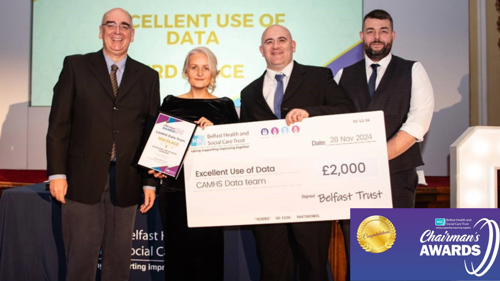Belfast Health and Social Care Trust (CAMHS): Excellent use of data
Belfast Health and Social Care Trust, a CORC member service, were delighted to be awarded third place in the Chairman's Award 2024 for their work developing a standard process for collection, collation and analysis of outcome measures data to evidence service effectiveness across Child and Adolescent Mental Health Services (CAMHS).

Background
Before 2020 the practice of using outcome measures and data varied considerably between Belfast CAMHS Teams. The CAMHS Senior Leadership Team set out to investigate this issue and to identify and implement appropriate solutions. Their investigation included the implementation of the CORC Practice and Attitudes staff survey in order to capture the perspectives of staff across CAMHS teams about the use of measures and data, both in their practice and as a service.
The Leadership Team discovered that many CAMHS staff had not received appropriate training and support to embed the use of outcome measures into their practice. Staff often felt that using measures was an administrative exercise and did not feel confident to choose and use measures. Furthermore, the service lacked a meaningful protocol for Routine Outcome Measurement (ROM) which meant that there wasn’t an established process for staff to follow or expectations for the use of measures.
The CAMHS Leadership Team sought to embed ROM into CAMHS services so that they could identify and evidence trends in service access and outcomes, to ensure their service users were placed on the most appropriate pathway and had access to appropriate evidence-based care. Robust and routine outcomes data were needed to understand the effectiveness of the service including comparisons with other similar services. Ultimately the aim of this work was to enhance service delivery and to improve outcomes for young people and their families.
Actions
With support from CORC, Belfast CAMHS set about promoting the value of ROM to staff teams and providing suitable training to ensure staff have the necessary skills. The CAMHS Leadership Team also developed a standardised process for ROM and piloted this across a small number of CAMHS teams. This process identified three standardised outcome measures that were to be implemented across these teams including the Children’s Global Assessment Scale (CGAS), to capture the staff perspective of any change during treatment, and the Goal Based Outcomes (GBO), to capture any progress towards a service users therapeutic goals. Initially the process of using measures and capturing the associated data was basic, involving paper-based measures and manual data entry. Soon however practice was developed to enable simpler and more responsive procedures including electronic-based measures. The service now has a standard paperless procedure for collecting, collating and analysing outcome information across seven teams.
To boost engagement with ROM, the CAMHS teams initiated some ‘friendly competition’, where the service tracked and reported the number of measures being collected, and the proportion of measures being completed more than one time for each team.
The service established the role of ‘Outcomes Champion’, a clinical member of staff within CAMHS who monitors the use of measures in their team and provides support to their colleagues to routinely use measures. Monthly updates are provided to their teams to let them know how they performed in terms of the use of measures.
Results
The service has embedded the use of outcome measures within their service. Within one year of this work, one CAMHS team went from little discernible outcomes collection, to achieving 100% of measures completion at assessment stage. Since then, five more teams are consistently achieving a 100% rate of measure completion at assessment each month. These teams are also achieving a rate of paired measure completion of over 45%, which means that almost half of service users complete measures again after their assessment stage.
Each year, Belfast CAMHS share their outcomes data with CORC for data analysis and reporting; this allows them to gain a better understanding of the effectiveness of their service including a comparison with other services in the CORC dataset.
Belfast Health and Social Care Trust are now able to quantify the impact their service is having on their service users and can use evidence to identify good practice as well as service need. Having such evidence of the difference that their work makes to service users provides staff with added motivation and encouragement to carry out their valuable work.
Great work in action.